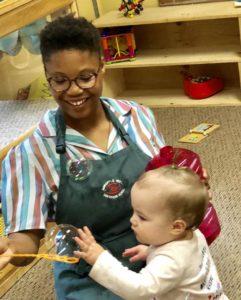
Your baby is years away from reading books by themselves or adding equations. But that doesn’t mean it’s too early to start their education. Take a look at what’s, why’s, and how’s of Montessori learning in the earliest years.
What Is Montessori Education for Infants?
Most Montessori schools start infant education as early as six-weeks of age. Even though your infant can go to “school,” this doesn’t mean Montessori babies learn in the same way older children do. But these classrooms or communities for the youngest students do follow the teachings of Dr. Maria Montessori and the educational philosophy she created.
The opportunity to learn through all five senses is central to Montessori education. This starts in infancy and progresses through all the learning years.
Along with learning through their senses, children in Montessori schools also play a central role in their own educational process. While this may mean child-directed and self-regulated activities or explorations for preschoolers and older children, infants will have additional support (as required by developmental level) from their teachers.
Like other Montessori classrooms, infant communities group children in a multi-age setting. In many schools you’ll find infants from zero (or six-weeks) through age three in the same room. Some schools may further divide this grouping in infants/young toddlers and older toddlers.
Why Choose Montessori Education for Infants?
Do you want your child to participate in a Montessori community in preschool, kindergarten, or beyond? There’s no better time to start than in the first three years. Infant development between ages zero and three is a time of change and rapid skill-building.
The cognitive, social, emotional, and physical benefits of Montessori education are particularly important during this time. While your child can learn, grow, and develop in another type of classroom, the Montessori community provides a way for your child to build self-help, self-discipline, and motivational skills early on.
Not only can an early start in the Montessori environment help your infant to develop their growing abilities, but it can also familiarize them with this type of educational setting. Even though some children wait to start a Montessori program until the preschool years, the early start can help your child acclimate to the school, the staff, and the philosophy itself.
What Do Infants Learn in Montessori Programs?
Again, the infant community is not the same as the preschool or kindergarten classroom. Unlike older children, who will delve deeper into academic material and build complex skills or abilities, infants typically focus on the basics. These may include (depending on the child’s specific age):
- Social interactions. Even though your infant is still pre-verbal, they can communicate with other people. The Montessori community provides plenty of opportunities for infants and young toddlers to develop basic social skills and interact with others.
- Language and literacy. From your baby’s first few words to full sentences, your child will get the chance to learn about language through interactive activities and explorations.
Independence. While the Montessori educator will supervise your child and ensure a safe environment, infants in these communities have the opportunity to explore physically, mentally, and socially. - Physical skills. As your child ages and grows, they’ll gradually build physical skills. The fine and gross motor skills your child practices daily in the Montessori classroom will help them as they move from sitting to crawling to pulling themselves up and standing.
How will your infant develop new skills at school? Montessori classrooms use specialized materials, such as an object permanence box or customized stairs, to explore their budding abilities.
Is your infant ready to take the first step in their education? Contact Miniapple International Montessori School for more information.

